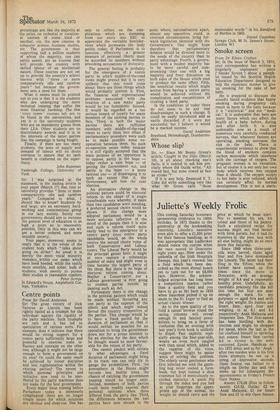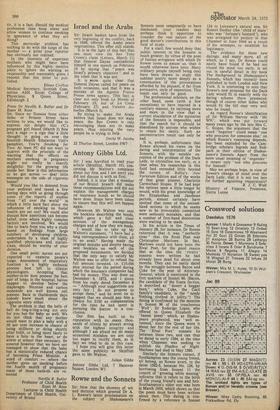Smoke screen
From Dr Eileen Crofton Sir, In the issue of March 3, 1973, your correspondent has written a singularly unpleasant piece (' Smoke Screen ') about a pamph let issued by the Scottish Health Education Department designed to help the expectant mother to give up smoking for the sake of her baby.
He is prepared to discount the soundly based evidence that heavy smoking during pregnancy can result in harm to the baby because it is " statistical " and not "medi cal." It is undeniable that here are many facors which can affect the health of a baby before, during and after birth. It is also undeniable now as a result of numerous very carefully conducted surveys, that whatever factors are operating, smoking increases the risk to the baby. There is experimental evidence to show that the blood of smokers contains carbon monoxide which interferes with the carriage of oxygen. The pregnant woman is no exception, but of course it is not only her own body which receives less oxygen than it should. The oxygen supply . to her baby is also reduced, which can seriously affect its normal development. This is not a statis
tic, it is a fact. Should the medical profession then keep silent and allow women to continue smoking in ignorance of what they are doing?
This particular problem has nothing to do with the lungs of the mother — a point your reporter has obviously not realised.
In the interests of expectant mothers who might have been influenced by this highly, emotive piece to ignore the warning so responsibly and reasonably given I request that this letter be published.
Eileen Crofton Medical Secretary, Scottish Committee ASH, Royal College of Physicians, 9 Queen Street, Edinburgh 2
From Dr Neville R. Butler and Dr Euan M. Ross
Sir, Since no floosies from either Soho or Princes Street have written to you, we would like to express out delight that PC's pregnant girl friend (March 3) flew into a rage — a sign that a little thought is going on over the Scottish Health Education Unit's pamphlet, You're Smoking for Two. At least PC did not want to quarrel with the principle of the warning that the effects on mothers smoking in pregnancy might not really be exactly delightful for the growing life inside her. How is this information to be got across — dear little messages on the side of cigarette boxes?
Would you like to descend from your pedestal and spend a few boring days with us going through some of the reports of studies from " all over the world " in which a little hard fact about the influences of smoking on foetal health are set out? We could also discuss how assertions can become belief, even where highly complex factors are involved. We would like to learn from you why a study based on findings from large numbers of developing children, undertaken by a team of highly qualified physicians and statisticians, should be worthy of your derision.
One small point: nurses are not expected to examine people's lungs. Assessment of respiratory function is a highly technical process best left to clinical physiologists. Accepting that mother-to-be does possess the best pair of lungs in the hospital, babies happen to develop below the diaphragm. Nicotine and carbon monoxide are well known cell poisons. Back in thalidomide days nobody knew much about the cigarette story either. The problem is that the bells of hell do ting-a-ling-a-ling not only for you but for baby as well. We do not think that any mother would want to plan a baby with a 30 per cent increase in chance of being stillborn or dying shortly after birth, or being more likely to have a hole in the heart, or do worse at school than necessary. Be assured however that we have not managed to show that the baby has a statistically reduced chance of becoming Prime Minister. A word of comfort — where the mother gives up smoking before the fourth month of pregnancy many of these hazards are removed Neville R. Butler Professor of Child Health Euan M. Ross Lecturer in Child Health Department of Child Health, University of Bristol



































 Previous page
Previous page